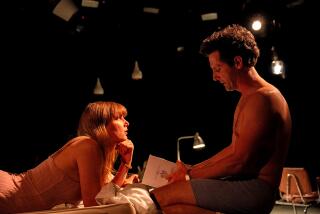Eccentricity on the Loose in ‘Little Egypt’ : Theater review: The Met’s engaging portrayal of the love lives of a small town’s quirky inhabitants flirts with tragedy.
- Share via
It would be diminishing to say that playwright Lynn Siefert is Sam Shepard Lite but not totally misguided. In “Little Egypt,” Siefert’s seriously whimsical play now at the Met Theatre in Hollywood, everyone in the tiny town of Little Egypt, Ill., has a lot of quirks and a fanciful name. Not one but three rivers run through the town, providing convenient sites for suicide should anyone’s eccentric unhappiness turn into literal misery.
In fact, the patriarch of a family named Waltz took the river option long ago. And that option is always a danger for the remaining Waltzes, all three waitresses who sport pink uniforms at the local pancake house. The women’s love lives are the focus of the drama. Mom (Jenny O’Hara), a bit of a boozer with an alarmed expression on her face, takes up with the local mayor, Hugh Door (Guy Boyd), “the most powerful man south of U.S. 50.” Estranged from his wife, Hugh is given to instantaneous bursts of crying. An optimistic if honest wooer, he tells Mrs. Waltz, “You’re beautiful . . . in this light.”
The sexy daughter Bernadette (Elizabeth Ruscio, with a great nervous laugh and adorably suspicious eyes) is the kind of self-pitying single girl who can never seem to attract a decent man (“My bedroom is the jerk hall of fame”). Her newest flame, met at the mall, the freeloading Watson Mason (Gregg Henry), is no exception.
Finally, there is our Cinderella, Celeste Waltz (the wonderfully ethereal Valerie Mahaffey), a bookworm with a Joyce Carol Oatsian swan neck and big glasses. Celeste is the only member of the family to have gone to college (“I was looking for proof of the external world”). She would rather read a history of penicillin than converse. Her combination of sensible oddness is summed up by the opinion “I don’t believe in war. Why kill people if you’re not going to eat them?”
Celeste finds her match in a security guard with low self-esteem, Victor Mulkey Hood (John C. Reilly). When Victor woos Celeste, he exclaims, “I feel pretty good! I feel like making a dynamic speech!” He settles for singing “Old Man River” on his knees.
As all this demonstrates, Siefert’s use of detail in painting character is amusing and sometimes telling, but it often tips the scale from interestingly quirky to overbearingly so. The scale very much depends on the quality of the acting. And, under the direction of Lisa James, the women in this strong cast inject just the right note of bitter reality into their quirks. The men are left to topple over into caricature.
With perhaps the most demanding role as the wounded, wanting Victor, Reilly underlines both the character’s slowness and his sweetness with a strangulated voice and a hangdog expression. He can bear to meet very few people’s gazes. Victor is unable to lie down, due to some terrible image that comes into his head when it hits the pillow. Rather like the Elephant Man of Illinois, poor Victor must sleep sitting up in a chair.
Reilly gives a doleful performance that never becomes truly touching because he seems to pity his own character. As Watson, Henry is a one-note, surly macho loser. Boyd is extremely likable as the mayor, perhaps because his troubles are less well outlined by the playwright.
The women are vivid, though, and seem to vibrate with their afflictions rather than carefully wear them. In the end, a happy conclusion befits a play that flirts with the dark but clearly casts its vote with the light. Let’s just say the river may run through it, but it doesn’t win out.
* “Little Egypt,” Met Theatre, 1089 N. Oxford Ave., Hollywood, Thursdays-Saturdays 8 p.m.; Sundays 7:30 p.m. Dark Thanksgiving Day. Ends Dec. 23. $20. (213) 957-1152. Running time: 2 hours, 20 minutes.
More to Read
The biggest entertainment stories
Get our big stories about Hollywood, film, television, music, arts, culture and more right in your inbox as soon as they publish.
You may occasionally receive promotional content from the Los Angeles Times.










